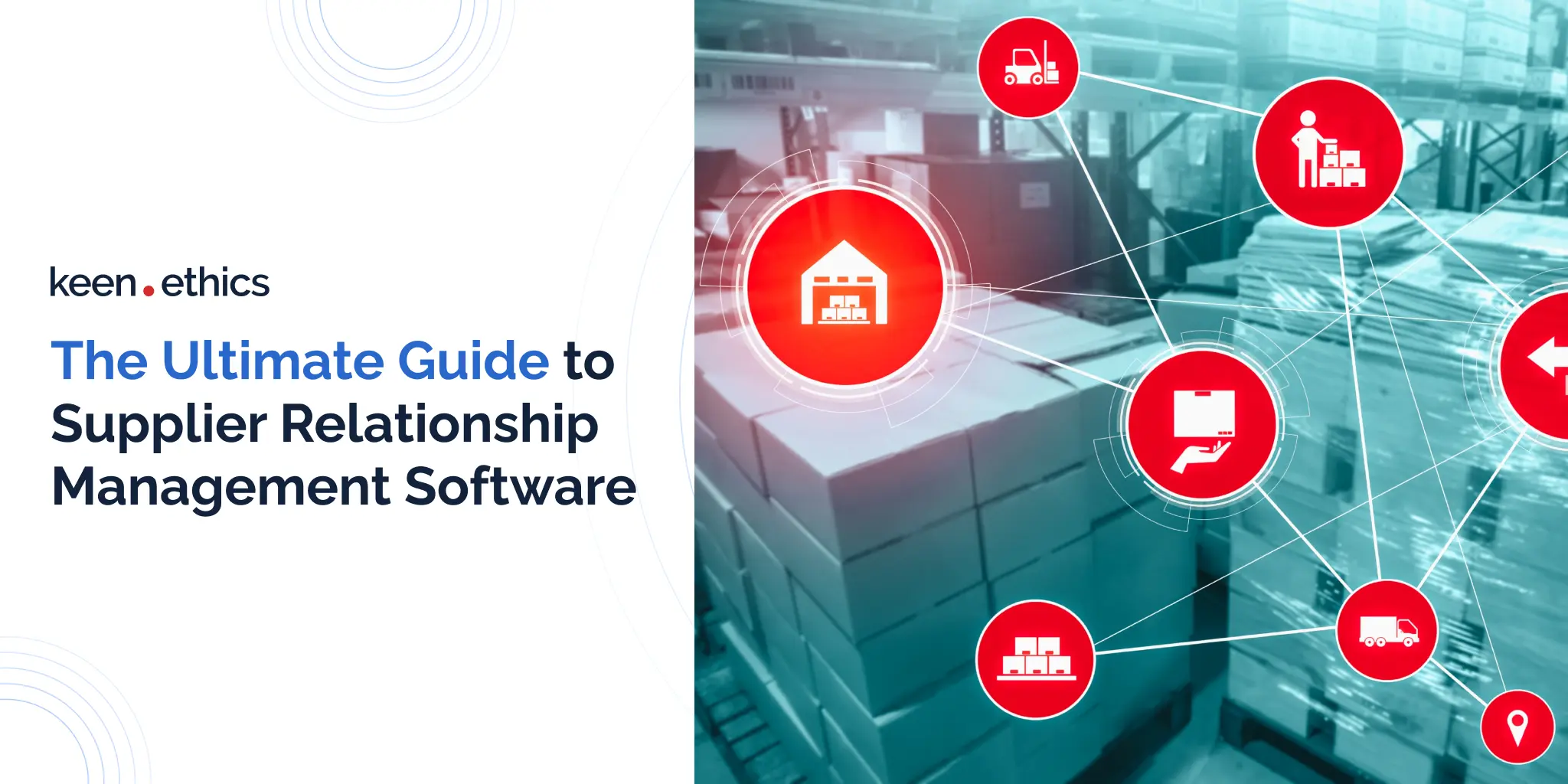Do you want to learn more about supplier relationship management software? This article is a definitive guide to this topic!
Suppliers represent one of the most important stakeholder groups for any business. If you don’t get certain supplies on time, the likelihood of failure for your company is likely to grow significantly. In this article, we intend to review a technology that can offer major cost savings when it comes to interactions with all types of suppliers. This technology is the so-called supplier relationship management software.
What Does Supplier Relationship Management (SRM) Software Represent?

A typical supplier relationship management system is notable for its ability to provide the users with all key information on potential company suppliers. What exactly do these systems offer? Above all, their core experience includes a data collection approach that allows you to see the impact of certain suppliers on your business. For instance, it’s possible to learn if a particular group of suppliers provides a beneficial relationship for you or not. Using this information, one can choose the most robust supplier for themselves, maximizing the value of their business. In short, this technology is one of the best ways to assess whether contracts with suppliers make sense or not.
Key Features of SRMS
Modern SRMS frameworks have several important features that allow you to clearly understand the quality of relationships with suppliers. In this light, our recommendation is to look for the following features while working with this technology:
1. Data management
The first and most critical aspect is the presence of data management capabilities in your software. You should have the capability to swiftly analyze information about all types of suppliers in such systems. In this way, it’s possible to create a high-quality strategy for contracts with suppliers. A good SRMS tool primarily focuses on strong instruments for analyzing all types of data.
2. Supplier risk management
The second feature that is vital for a typical supplier relationship management solution is undoubtedly risk analysis. A good SRM software should provide you with insights into the reliability of your connections with various supply partners. It can do it through a set of formulas for risk analysis, which are popular in manufacturing software and finances. What information should a system be able to collect to make high-quality judgments? Firstly, it must know the success rates of your supply partners. Secondly, supplier relationship management tools must have a clear insight into its failures. Lastly, small details such as delivery speed and, for example, response time can also play a major role in the calculations of the success ratings. The more information your system collects, the higher the accuracy of the calculations it can offer. Ultimately, high-quality calculations can become the basis for improving decision-making in your firm concerning suppliers.
3. Supply procurement tools
To collect information in the first place, a high-quality SRM system should, above all, have access to all types of transactions with supply partners. The best way to have this information is to add procurement rights to the supplier management process. In this regard, the core software of this type on the market is typically capable of hosting all your transactions with the partners. In this way, it maximizes value for you by minimizing efforts for data collection and transformation. For this reason, a typical supply procurement tool already has elements of SRM, and vice versa.
4. Supplier selection tools
The best way to work with suppliers is to have an opportunity to choose from multiple options on the market. In this respect, supplier relationship management software must have tools for hosting several suppliers and allowing them to compete for your attention. What is necessary for those functions to work well? Above all, you should have the capability to collect information on the suppliers and allow them to deliver their data through some type of profile. With the help of this data, major companies can then make clear decisions on supplier strategy, which maximizes the positive impacts of cooperation between different firms.
5. Supplier performance management
SRM systems are also notable for their ability to promote supplier performance control. What do we mean by this? Firstly, Supplier Relationship Management Software includes the ability to analyze the long-term trends in the work of suppliers. Secondly, a major aspect to consider is the capability to control the supply chains in general. This means that an SRM tool must have instruments for controlling various orders and clearly outlining what one or another supplier should do. All in all, performance control involves the analysis and promotion of all business requirements.
6. Supplier contract management
All supply-oriented tasks involve some form of contract. Consequently, you should have the capability to establish and control those contracts and other legally binding documents through supplier management software. What modules can offer you such capabilities? In our opinion, the most important element is to include customer service instruments for document control. Your supplier relationship management software should have the capacity to promote easy signing of documents for the majority of users to be feature-complete. Since all supply operations typically require contracts to ensure maximal security for all parties, this feature is central to attracting a maximum number of users to a particular brand of software.
7. Supplier dashboard
Lastly, you should also consider suppliers when creating SRM frameworks. After all, you engage in a collaborative relationship with them through the use of those platforms. As a result, they must have as many tools for enhancing their capabilities as possible. For example, knowledge about certain tendencies in supply chain approaches can provide a major competitive edge to some firms. If they know how impactful they’re for your business, these companies can then use the data to improve their services even further and solidify your relationship with them as much as possible.
SRM Benefits

Modern SRM offers numerous benefits to existing firms. In our opinion, here are some core reasons to invest in apps of this kind if you want to maximize your competitive advantage:
Significant cost reduction
The first and most important reason to invest in platforms of this type is the reduction in costs. In one way or another, SRM platforms are notable for their capability to minimize the amount of funds you spend on suppliers. How exactly do those systems achieve their goal? Above all, by allowing you to minimize the amount of funds you spend on inefficient suppliers, SRM software is capable of showing you the most optimal allocation of resources. Consequently, an upgraded supplier base can become a major source of cost optimization for the relevant firms.
Improved risk management
Supplier segmentation through an SRM platform is also a perfect way to reduce risks. In this respect, you can improve your risk management in two ways. Firstly, an SRM platform can offer you a way to validate the suppliers. In this way, you’ll reduce the risks of working with unlicensed individuals. Secondly, risk management is also promoted by those platforms through their focus on data collection. SRM frameworks are notable for their ability to analyze the behavior of certain suppliers and then provide a judgment on their long-term efficiency from the standpoint of your business.
Upgraded communication
Supplier relationship management software greatly upgrades communication between suppliers and their clients. How exactly do those platforms achieve this goal? Primarily, by offering a unified place for communication between different parties. All this allows potential suppliers to contact you faster in case of any emergencies. More importantly, you get an opportunity to ensure higher supplier compliance because the likelihood of them seeing your messages on time grows.
Boosted visibility
It’s not only communication that matters during the supply chain management process. You can also greatly benefit from major investments in visibility. Modern SRM frameworks create an elaborate system of status updates for the involved users. For instance, your supplier can openly report at which stage their delivery is. Moreover, RFID software can often make those reports more or less fully automatic, reducing the likelihood of errors in the production process. High visibility also greatly lowers the risk of supply disruption. How exactly does it achieve this? Above all, Supplier Relationship Management Software does this with a focus on the notification systems that can report any problems during the supply process. As a result, those systems are notable for lowering long-term risks for all involved parties and preventing significant disruptions in their production processes.
Maximal supplier utility
Lastly, you can maximize the utility of a supplier for your firm with the help of the presented systems. How exactly can you achieve this? The first positive impact comes in the form of reduced document management pressure. It’s easy to create contracts with the help of those systems. Another major positive influence comes from analytics. You can find supplies that your partner is the most adept at and maximize their value through the use of SRM frameworks. Hence, the presented systems offer higher financial stability for all stakeholders. On the one hand, you can gain better resource management through the use of those tools. On the other hand, your partners are likely to have a more steady supply of orders.
Key Challenges of SRM

Ultimately, SRM creates several major challenges for the relevant decision-makers. While it offers great opportunities such as strategic sourcing, it can also lead to some long-term negative tendencies:
Insufficient alignment
The first core challenge of SRM is the threat of insufficient alignment with your partners. For example, it may stem from situations in which you use radically different software types. A good SRM software should typically be compatible with the core standards on the market to function well. If this doesn’t happen and your supplier doesn’t use aligned software in their everyday work, there’s a risk of disrupting the relevant ongoing activity for your firm. App incompatibility is, regrettably, a major risk with such systems, requiring big investments in the improvement of long-term compatibility levels.
Failure to attract diverse suppliers
A major problem with SRMs is that they greatly depend on the quality of the incoming data. If you attract suppliers who come from the same market and similar backgrounds, there’s a big risk of encountering major problems with data stability. For instance, you may be unable to understand whether one supplier is better than the other simply because there are minor fluctuations in their daily productivity. For a history of supplier interaction to work well, you need to focus on a diverse set of suppliers with different methodologies. In short, a wide market may be necessary for productive interaction between you and the suppliers.
Inability to mitigate risk
Supplier relationship management software is great for its capability to collect data on risk. However, the collection of data on risk doesn’t necessarily mean that it will mitigate risk properly. In this light, SRM frameworks function the best only in conditions where you know how to work with risks. If you don’t possess this knowledge and fail to interpret values properly, then you can easily exaggerate the reliability of certain vendors. This, in turn, will not only render SRM platforms useless for you, but also make those systems quite harmful.
Insufficient visibility discipline
Lastly, the SRM software has one more significant weakness. This weakness comes in the form of its reliance on vendor discipline. In short, you can receive high-quality information only if vendors share it. In cases where there are major issues with discipline, you can easily face a situation in which your SRM system will simply fail to provide high-quality data. Consequently, supplier relationship management software significantly relies on your ability to collect data. If the data is of low quality, then those systems will be wholly inefficient.
Keenethics as a Supplier Relationship Management Partner

Keenethics is a company with more than 8 years of experience in creating different software solutions. Among the products we’ve created, manufacturing apps take a major spot. In this regard, we’ve also developed systems that incorporate elements of SRM. For example, GetPart is a system for controlling the supply of various machine parts. Using such systems, you can greatly elevate the quality of decisions made in your firm. Don’t hesitate to address our company to start developing your custom-made solution for SRM.
Conclusion
To summarize, SRM development can be among the core tasks for manufacturing companies. In this respect, we recommend those solutions because they greatly decrease the pressure on your supply lines in the majority of cases. You can identify costs and streamline events related to purchases in your business with the help of such frameworks. Our company knows how to develop these solutions and can, thus, assist you with creating them for your firm.
FAQ
Are SRM tools a worthy investment?
In our opinion, yes. They greatly reduce risks during supply chain management and streamline planning for key suppliers. Hence, you get to reduce the pressure on your firm’s finances with the help of such platforms.
How to find the right SRM software supplier?
The best way to find supplier relationship management software is to look for two sources. On the one hand, you can review the existing vendors on the market. Many of them offer general but quite robust solutions. On the other hand, one can address companies like ours (Keenethics). It’s possible to develop your solution for SRM from scratch.
What are some use cases for SRM?
SRM has many positive use cases for the relevant customers. In this respect, it’s notable for the ability to track supplier activity and optimize document management. You can also use those systems to manage every supply chain operation.
What features are crucial for SRM software?
SRM software can primarily benefit from a user-friendly interface, data analytics, and clear performance management tools.
Develop a full-scale solution together with Keenethics!

























